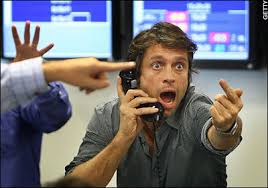
After all the geo-political worries of a couple of weeks ago regarding the Ukraine and Iraq, shares are back on the up yet again.
With Kurdish and Iraqi forces retaking the key strategic asset of the Mosul dam in Northern Iraq and with continued fighting in Eastern Ukraine down played by the markets all seems well in the equity world right now.
The S&P 500 has bounced 3.3% in the past eight sessions with the Nasdaq Composite index back at a 14-year high. The S&P 500 is just 0.8% off its July 24 record close and at 4,508 the Nasdaq is at its its highest level since March 2000. The Dow Jones industrials rose 176 points yesterday on the back of upbeat housing data. There’s no stopping the bulls right now!
But not everyone is relaxed about the current state of the equity markets. Yale professor Robert Shiller has been saying at the weekend that “The United States stock market looks very expensive right now.” He cites the CAPE ratio (cyclically adjusted price-earnings) or Shiller P/E, a measure that he helped create. The ratio takes average inflation-adjusted earnings for the S&P 500 index over the previous 10 years and the index has roughly shown an average of 15 over the last century. A year ago the ratio was at 23, and it is now at 25, a level that since 1881 has only been surpassed in three other periods — the years surrounding 1929, 1999 and 2007.
So it seems that the recent sell off was certainly a short term opportunity for some gains. The 2000 level on the S&P 500 will be a key break in coming sessions. With other investments like gold and bonds proving to be weak for now, it seems that the markets are continuing to have confidence in equities despite worries about over valuation.
Contrarian Investor UK
IMPORTANT: The posts I make are in no way meant as investment suggestions or recommendations to any visitors to the site. They are simply my views, personal reflections and analysis on the markets. Anyone who wishes to spread bet or buy stocks should rely on their own due diligence and common sense before placing any spread trade.
by contrarianuk
Bullish tone back in control as geo-political issues recede
Aug 19, 2014 at 9:01 am in Market Commentary by contrarianuk
After all the geo-political worries of a couple of weeks ago regarding the Ukraine and Iraq, shares are back on the up yet again.
With Kurdish and Iraqi forces retaking the key strategic asset of the Mosul dam in Northern Iraq and with continued fighting in Eastern Ukraine down played by the markets all seems well in the equity world right now.
The S&P 500 has bounced 3.3% in the past eight sessions with the Nasdaq Composite index back at a 14-year high. The S&P 500 is just 0.8% off its July 24 record close and at 4,508 the Nasdaq is at its its highest level since March 2000. The Dow Jones industrials rose 176 points yesterday on the back of upbeat housing data. There’s no stopping the bulls right now!
But not everyone is relaxed about the current state of the equity markets. Yale professor Robert Shiller has been saying at the weekend that “The United States stock market looks very expensive right now.” He cites the CAPE ratio (cyclically adjusted price-earnings) or Shiller P/E, a measure that he helped create. The ratio takes average inflation-adjusted earnings for the S&P 500 index over the previous 10 years and the index has roughly shown an average of 15 over the last century. A year ago the ratio was at 23, and it is now at 25, a level that since 1881 has only been surpassed in three other periods — the years surrounding 1929, 1999 and 2007.
So it seems that the recent sell off was certainly a short term opportunity for some gains. The 2000 level on the S&P 500 will be a key break in coming sessions. With other investments like gold and bonds proving to be weak for now, it seems that the markets are continuing to have confidence in equities despite worries about over valuation.
Contrarian Investor UK
IMPORTANT: The posts I make are in no way meant as investment suggestions or recommendations to any visitors to the site. They are simply my views, personal reflections and analysis on the markets. Anyone who wishes to spread bet or buy stocks should rely on their own due diligence and common sense before placing any spread trade.